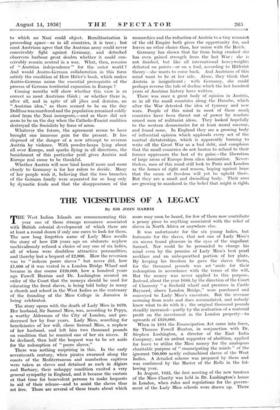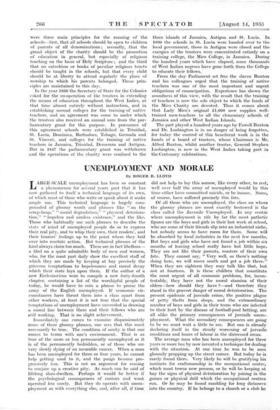THE VICISSITUDES OF A LEGACY
By SIR JOHN HARRIS THE West Indian Islands are commemorating this year one of those 'strange romances associated with 'British colonial development of which there are at least a round dozen if only one cares to look for them. The now long forgotten name of Lady Mico recalls the story of how 250 years ago an obdurate nephew unchivalrously refused a choice of any one of six ladies, all of whom were doubtless attractive personalities, and thereby lost a bequest of £2,000. How the reversion was to " redeem poore slaves " but never did, how £1,000 of it was vested in a London Bridge Wharf and became in due course £120,000, how a hundred years ago Powell Buxton and Dr. Lushington secured an order of the Court that' the moneys should be used for educating the freed slaves, is being told today in many a ehurch and school in the West Indies as the centenary of the founding of the Mieo College in Jamaica is being celebrated.
The story opens with the death of Lady Mico in 1670. Her husband, Sir Samuel Mico, was, according to Pepys, a worthy Alderman of the City of London, and pre- deceased her by four -years. Lady Mico, searching for beneficiaries of her will, chose Samuel Mico, a nephew of her husband, and left him two thousand pounds on condition that he married one of her six nieces. If he declined, then half the bequest was to be set aside for the redemption of " poore slaves."
There was nothing surprising in this. In the early seventeenth century, when pirates swarmed along the coasts of the Mediterranean and numberless captives were taken as slaves and detained as such in Algiers and Barbary, their unhappy condition excited a very general sympathy in England, and it became the custom at that time for benevolent persons to make bequests in aid of their release—and to assist the slaves thus set free. There are several of these trusts about which more may soon be heard, for few of them now contribute a penny piece to anything associated with the relief of slaves in North Africa or anywhere else.
It was unfortunate for the six Young ladies, but fortunate for the slaves, that not one of Lady Mico's six nieces found pleasure in the eyes of the ungallant Samuel. Nor could he be persuaded to change his mind even by the promise of Lady Mico's best pearl necklace and an unbcqueathed portion of her plate. By keeping his freedom he gave the slaves theirs, for the thousand pounds was set • aside for their redemption in accordance with the terms of the will. But the money was never applied to this purpose. Instead, about the year 1680, by the direction of the Court of Chancery " a freehold wharf and premises in Castle Baynard, above London Bridge," were purchased and conveyed to Lady Mico's executors. But the revenue accruing from rents and dues accumulated, and nobody knew what to do with it ; the original thousand pounds steadily increased—partly by the realisation of a material profit on the investment in the London property—to upwards of £120,000. When in 1834 the Emancipation Act came into force, Sir Thomas Fowell Buxton, in conjunction with Dr. Stephen Lushington, a director of the East India Company, and an ardent supporter of abolition, applied for leave to utilise the Mico money for the analogous charitable purpose of " emancipating the minds " of the ignorant 700,000 newly enfranchised slaves of the West Indies. A detailed scheme was prepared by them and was confirmed by the Master of the Rolls in the fol- lowing year.
In August, 1835, the first meeting of the new trustees of the Mico Charity was held in Dr. Lushington's house in London, when rules and regulations for the govern- ment of the Lady Mico schools were drawn up. There were three main principles for the running of the schools—first, that all schools should be open to children of parents of all denominations ; secondly, that the grand object of the charity should be the promotion of education in general, but especially of religious teaching on the basis of Holy Scripture ; and the third that no catechism or books of peculiar religious tenets should be taught in the schools, but that every child should be at liberty to attend regularly the place of worship to which his parents belonged. These grin- ciples are maintained to this day.
In the year 1836 the Secretary of State for the Colonies asked for the co-operation of the trustees in extending the means of education throughout the West Indies, at that time almost entirely without instruction, and in establishing normal colleges for the training of native teachers, and an agreement was come to under which the trustees also received an annual sum from the par- liamentary grant for this purpose. In pursuance of this agreement schools were established in Trinidad, St. Lucia, Dominica, Barbadoes, Tobago, Grenada and St. Vincent, and colleges for the training of native teachers in Jamaica, Trinidad, Demerara and Antigua. But in 1847 the parliamentary grant was withdrawn and the operations of the charity were confined to the three islands of Jamaica, Antigua and St. Lucia. In 186o the schools in St. Lucia were handed over to the local government, those in Antigua were closed and the energies of the trustees were concentrated entirely on a training college, the Mico College, in Jamaica.. During the hundred years which have elapsed, some thousands of West Indian negroes have gone forth from the College to educate their fellows.
From the day Parliament set free the slaves Buxton and his colleagues urged that the training of native teachers was one of the most important and urgent obligations of emancipation. Experience has shown the soundness of this view, with the result that the training of teachers is now the sole object to which the funds of the Mico Charity are devoted. Thus it comes about that Lady Mico's original £1,000 now supplies well- trained men-teachers to all the elementary schools of Jamaica and other West Indian Islands.
The part played a hundred years ago by Fowell Buxton and Dr. Lushington is in no danger of being forgotten, for today the control of this beneficent work is in the hands of a board of trustees, whose Chairman is Mr.. Alfred Buxton, whilst another trustee, General Stephen Lushington, is now in the West Indies taking part in the Centenary celebrations.







































 Previous page
Previous page